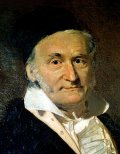Johann Carl Friedrich Gauss

Johann Carl Friedrich Gauss (30 April 1777 - 23 February 1855), the "Prince of Mathematics," exhibited his calculative powers when he corrected his father's arithmetic before the age of three. His revolutionary nature was demonstrated at age twelve, when he began questioning the axioms of Euclid. His genius was confirmed at the age of nineteen when he proved that the regular n-gon was constructible, for odd n, if and only if n is the product of distinct prime Fermat numbers. At age 24 he published Disquisitiones Arithmeticae, probably the greatest book of pure mathematics ever.
Gauss built the theory of complex numbers into its modern form, including the notion of "monogenic" functions which are now ubiquitous in mathematical physics. The other contributions of Gauss are quite numerous and include the Fundamental Theorem of Algebra (that an n-th degree polynomial has n complex roots), hypergeometric series, foundations of statistics, and differential geometry. Gauss was the premier number theoretician of all time, proving Euler's Law of Quadratic Reciprocity. He also did important work in geometry, providing an improved solution to Apollonius' famous problem of tangent circles; stating and proving the Fundamental Theorem of Normal Axonometry, and solving astronomical problems related to comet orbits and navigation by the stars. Gauss also did important work in several areas of physics, and invented the heliotrope.
Much of Gauss's work wasn't published: unbeknownst to his colleagues it was Gauss who first discovered doubly periodic elliptic functions, non-Euclidean geometry, a prime distribution formula, quaternions, foundations of topology, the Law of Least Squares, Dirichlet's class number formula, the butterfly procedure for rapid calculation of Fourier series, and even the rudiments of knot theory. Also in this category is the Fundamental Theorem of Functions of a Complex Variable (that the line-integral over a closed curve of a monogenic function is zero): he proved this first but let Cauchy take the credit. Gauss is widely agreed to be the most brilliant and productive mathematician who ever lived and many would rank him #1; however several of the others on the list had more historical importance. Abel hints at a reason for this: "[Gauss] is like the fox, who effaces his tracks in the sand."
Gauss once wrote "It is not knowledge, but the act of learning, ... which grants the greatest enjoyment. When I have clarified and exhausted a subject, then I turn away from it, in order to go into darkness again ..."
Gauss was an ardent perfectionist and a hard worker. According to Isaac Asimov, Gauss was once interrupted in the middle of a problem and told that his wife was dying. He is purported to have said, "Tell her to wait a moment till I'm done." This anecdote is briefly discussed in G. Waldo Dunnington's Gauss, Titan of Science where it is suggested that it is an apocryphal story.
Source: Wikipedia

